Dear Zazie, Here is today’s Lovers’ Chronicle from Mac Tag dedicated to his muse. Follow us on twitter @cowboycoleridge. Have you ever been to the turnin’ point? Rhett
The Lovers’ Chronicle
Dear Muse,
© copyright 2020 mac tag/cowboy coleridge all rights reserved
well, yes and no
it was an awakenin’
of given-up-for-gone feelin’s
and it did change
the course of the verse
and for that i am thankful
it did not lead
where some hoped
i was torn
whether i wanted
it to or not
she is happy now
with another
and i as well
with you
in solitude
© copyright 2018 mac tag/cowboy coleridge all rights reserved
of Her presence
Cold, dread desire
She has come to use me
to amuse herself, to
feed on my passion
to satiate herself
And i will allow her
i will succumb because
she will give me the words
the dark words i must have
for i must have words to write
and i can no longer
hear words of light and love
lips upon mine
but then She turns and leaves
i call out, plead with Her
to return, that She may
have whatever She wants
But She does not return
And I am left
cold and alone
bereft, without
words, with nothin’
It is, but soft, a light
growin’ nearer
Wait, not a light, a woman
naked, next to my bed
and she is beautiful
with blonde hair and blue eyes
She raises the covers
and lays herself on top of me
pressin’ her face against my chest
She is so warm
a warmth such as i have never known
and it fills me complete,
and stills my shiverin’
She whispers, but i cannot hear
i feel her breath
and her whispered words
flowin’, soothin’ across my skin
The same refrain,
she whispers, over and again
until,
the meanin’ begins to sink in
and i can feel
what she has been sayin’
Then, finally,
i can hear her
as she whispers over again,
The words will come
the words will come
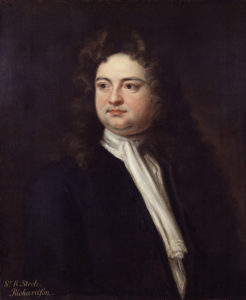 On this day in 1707 Irish writer Richard Steele sat in St. James Coffee House in London and wrote a love letter to Mary Scurlock, whom he wanted to marry.
On this day in 1707 Irish writer Richard Steele sat in St. James Coffee House in London and wrote a love letter to Mary Scurlock, whom he wanted to marry.
“Madam — It is the hardest thing in the world to be in love, and yet attend to business. As for me, all who speak to me do find out, and I must lock myself up, or other people will do it for me.
“A gentleman asked me this morning, ‘What news from Lisbon?’ and I answered, ‘She is exquisitely handsome.’ Another desired to know ‘when I had been last at Hampton Court?’ I replied, ‘It will be on Tuesday come se’nnight.’ Pr’ythee allow me at least to kiss your hand before that day, that my mind may be in some composure. O love!
“A thousand torments dwell about thee,
Yet who would live, to live without thee?”
They got married later in 1707. They stayed married, though perhaps stormily, until her death in 1718. During their relationship Steele wrote her more than 400 letters.
| Innokenty Annensky | |
|---|---|
 |
|
Today is the birthday of Innokentiy Annensky (Innokentiy Fyodorovich Annensky; Omsk, Russian Empire; September 1, 1855 (N.S.) – December 13, 1909 (N.S.) St. Petersburg, Russian Empire); poet, critic and translator, representative of the first wave of Russian Symbolism. Sometimes cited as a Slavic counterpart to the poètes maudits, Annensky managed to render into Russian the essential intonations of Baudelaire and Verlaine, while the subtle music, ominous allusions, arcane vocabulary, the spell of minutely changing colours and odours were all his own. He influenced the first post-Symbolist generation of poets (Akhmatova, Gumilyov, Mandelshtam).
Annensky first gained renown with his translations of Euripides and the French Symbolists. From 1890 until his death in 1909, he translated from Ancient Greek all the works of Euripides. At the beginning of the 1900s, Annensky wrote a series of tragedies modelled after those of ancient Greece: Melanippa-filosof (1901), Tsar Iksion (1903), Laodamia (1906). Some of these works were dedicated to his colleague, Faddei Zielinski, who would later write his obituary.
Among the worlds, in glimmering of stars,
The single Star is ever my attraction…
Not because i had so wanted you so far,
But because I live with others with aversion
And if my doubts are an awful plight,
I just from you wait for the final answers,
Not because you send to me the saving light,
But because with you I can live and in darkness
Among cold worlds, immersed in starry glow,
There is the One, whose name I always utter
Not because you have my all to give
But because I languish with others
And if heavy with doubt
Yours is the only answer heeded
Not because your light is abundant
But because no light with you is needed
…
a feeling; a shadow
in the light near you – you listen,
at night, silently hugs…
together night and day…
translations by mac tag
| Hilda Rix Nicholas | |
|---|---|
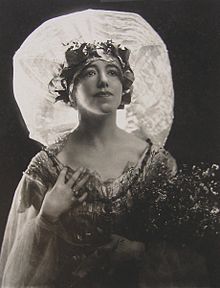
Rix Nicholas, c. 1920, dressed as “the spirit of the bush”
|
|
And today is the birthday of Hilda Rix Nicholas (née Rix, later Wright, Ballarat, Victoria, Australia 1 September 1884 – 3 August 1961 Delegate, New South Wales, Australia); artist. She was born in the Victorian city of Ballarat. Her father was an education administrator and poet, her mother was a musician and artist. She studied under a leading member of the Heidelberg School, Frederick McCubbin, at the National Gallery of Victoria Art School from 1902 to 1905 and was an early member of the Melbourne Society of Women Painters and Sculptors. Following the death of her father in 1907, Hilda Rix, her only sibling Elsie and her mother travelled to Europe where she undertook further study in London and then in Paris.
After travelling to Tangiers in 1912, Rix held several successful exhibitions of her work, with one drawing, Grande marche, Tanger, purchased by the French government. She was one of the first Australians to paint post-impressionist landscapes, was made a member of the Société des Peintres Orientalistes Français, and had works hung in the Paris Salon first in 1911 and again in 1913. The family evacuated from France to England after the outbreak of World War I. A period of personal tragedy followed, as Rix’s sister died in 1914, then her mother in 1915. In 1916 she met and married George Matson Nicholas, only to be widowed the next month when he was killed on the Western Front.
Returning to Australia in 1918, Rix Nicholas once more took up professional painting, and held an exhibition of over a hundred works at Melbourne’s Guild Hall. Many sold, including In Picardy, purchased by the National Gallery of Victoria. Following a period painting in rural locations in the early 1920s, Rix Nicholas returned to Europe. A 1925 exhibition in Paris led to the sale of her work In Australia to the Musée du Luxembourg, followed by an extensive tour of her paintings around regional British art galleries. There followed representation in other exhibitions, including at the International Society of Sculptors, Painters and Gravers, and the Royal Academy of Arts, both in London. Following the inclusion of several works in the 1926 Société Nationale des Beaux-Arts Spring exhibition in Paris she was made an Associate of that organisation.
In 1926, Rix Nicholas returned to Australia, and in 1928 she married Edgar Wright, whom she had met during her travels in the early 1920s. The couple settled at Delegate, New South Wales; their only child, a son named Rix Wright, was born in 1930. Though she continued to paint significant works including The Summer House and The Fair Musterer, Rix Nicholas, a staunch critic of modernism who was disdainful of the works of emerging major artists such as Russell Drysdale and William Dobell, grew out of step with trends in Australian art. Her pictures remained didactic, portraying an Australian pastoral ideal, and reviews of her exhibitions grew more uneven. She held her last solo show in 1947. Rix Nicholas remained at Delegate until her death in 1961. Her works are held in most major Australian collections, including the Art Gallery of South Australia, Australian War Memorial, National Gallery of Australia, National Gallery of Victoria, and the Queensland Art Gallery.
Gallery
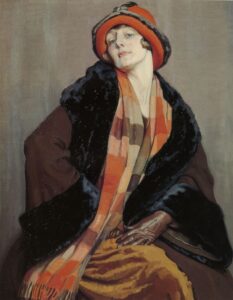
Une Australienne, 1926
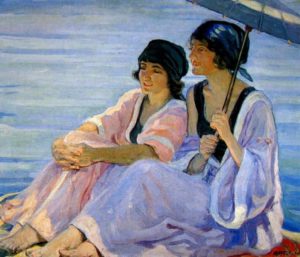
The Bathers
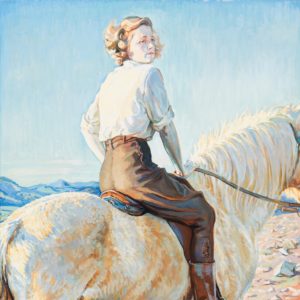
Autumn evenings golden glow, c.1942




Mac Tag

No Comments on "The Lovers’ Chronicle 1 September – a turnin’ point – love letter from Richard Steele to Mary Scurlock – verse by Innokenty Annensky – art by Hilda Rix Nicholas"